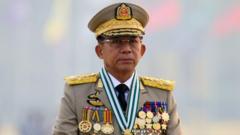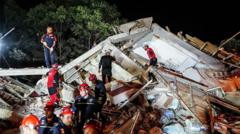Myanmar's junta chief, Min Aung Hlaing, arrived in Bangkok for a regional summit as his country grapples with the devastating aftermath of a recent earthquake that has claimed the lives of over 3,000 people. The major quake hit central Myanmar last Friday, resulting in 3,085 confirmed deaths and 4,715 injuries, with hundreds still unaccounted for.
Myanmar's Leader Attends Summit Amidst Quake Tragedy: Over 3,000 Dead

Myanmar's Leader Attends Summit Amidst Quake Tragedy: Over 3,000 Dead
Min Aung Hlaing's unexpected presence at the Bangkok summit comes as Myanmar faces devastating earthquake aftermath.
This summit, which brings together leaders from the seven nations bordering the Bay of Bengal, is marked by Hlaing's unique presence; typically, leaders under international sanctions are excluded from such gatherings. Thailand, the host nation that experienced tremors from the quake resulting in 21 fatalities, suggested that the regional leaders might issue a collective statement addressing the disaster.
Reports indicate that many areas affected by the earthquake in Myanmar remain inaccessible to rescue teams, rendering official death tolls likely inaccurate. Various nations worldwide have offered aid and dispatched rescue personnel. However, ongoing civil unrest compounded by poor infrastructure is hampering these relief operations.
In a recent development, the junta announced a temporary ceasefire to facilitate aid efforts after initially rejecting assistance proposals from ethnic rebel groups. Prior to the ceasefire, military actions continued, including an incident involving gunfire directed at a Chinese Red Cross convoy bearing supplies, allegedly triggered by the convoy's failure to halt upon military signal.
On the sidelines of the Bangkok meeting, Min Aung Hlaing is expected to engage with Thai Prime Minister Paetongtarn Shinawatra. The struggle in Myanmar has been exacerbated by ongoing civil war since the military coup in 2021, which has seen armed resistance forces emerge alongside ethnic groups opposing the military regime. The crisis has severely destabilized the nation, aggravating inflation and leading to increased humanitarian needs. As monsoon season approaches, humanitarian organizations are calling on the junta to remove any barriers to the flow of needed aid.
Reports indicate that many areas affected by the earthquake in Myanmar remain inaccessible to rescue teams, rendering official death tolls likely inaccurate. Various nations worldwide have offered aid and dispatched rescue personnel. However, ongoing civil unrest compounded by poor infrastructure is hampering these relief operations.
In a recent development, the junta announced a temporary ceasefire to facilitate aid efforts after initially rejecting assistance proposals from ethnic rebel groups. Prior to the ceasefire, military actions continued, including an incident involving gunfire directed at a Chinese Red Cross convoy bearing supplies, allegedly triggered by the convoy's failure to halt upon military signal.
On the sidelines of the Bangkok meeting, Min Aung Hlaing is expected to engage with Thai Prime Minister Paetongtarn Shinawatra. The struggle in Myanmar has been exacerbated by ongoing civil war since the military coup in 2021, which has seen armed resistance forces emerge alongside ethnic groups opposing the military regime. The crisis has severely destabilized the nation, aggravating inflation and leading to increased humanitarian needs. As monsoon season approaches, humanitarian organizations are calling on the junta to remove any barriers to the flow of needed aid.





















